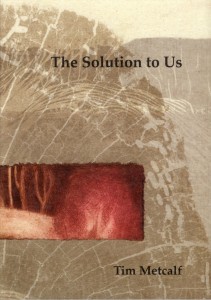 The Solution to Us by Tim Metcalf
The Solution to Us by Tim Metcalf
Ginninderra Press, 2008
Australia is home to a number of clinician poets, including general practitioners such as Peter Goldsworthy and Shen, and mental health specialists such as Jennifer Harrison, Robyn Rowland and Doris Brett. Tim Metcalf, a GP from Bega NSW, joined their ranks in 2001 when he published his first collection, Corvus (Ginninderra Press). The book included 'Stages of Dying', winner of the 2000 WB Yeats Prize, a spare poem that offered a confronting yet tender meditation on Elisabeth Kubler-Ross's teachings about death and dying.
The Solution to Us is Metcalf's fourth collection and his most mature and fully realised to date. Through previous books and individual poems – published in journals and newspapers such as Southerly, Blast, The Canberra Times and New Scientist – Metcalf has developed a reputation for writing with intensity and passion about the human side of being a general practitioner. While The Solution to Us traverses other subject matter – notably parenting, writing, astronomy and astrology – it is when writing about his experiences in the medical world that Metcalf's poetry is most powerful.
'The Good Hope' is for this reviewer the standout poem in the collection. Winner of the 2005 Rosemary Dobson Award, it unfolds in six parts and explores Metcalf's stint at Good Hope, a struggling hospital in midlands England, in the 1980s. Combining images of war and animal husbandry, the poem offers a stark view of a place where men and women are equally inured to hardship:
someone cuts a belly open,
four gloved hands up to the wrist in blood;
and in there I'm up to my elbow,
tearing the placenta from a fist of muscle;
and in there it sounds like a landing,
nurses hauling bodies up the gory shore,
The poem's later description of a father-to-be's reaction to a stillbirth is notable for its lack of sentimentality and its refusal to spare the reader the harsh truth of infant death.
If you're at all squeamish, it's best not to read Metcalf's poems about his experiences as a general practitioner. But at a time when many GPs, especially in Australia, are leaving the profession due to stress and overwork, Metcalf's poems on this subject make compelling reading.
'Support the Head' is another example: housed in a form that juxtaposes nursery rhymes with the poem's dark subject – a man accidentally runs over his toddler with a four-wheel drive – it interweaves the meaning of a common approach to patient care and a doctor's own need for post-trauma counselling, the latter, it seems, rarely provided:
I could not rest in mind or bed.
I could not monitor myself.
Nobody monitored me.
The poet describes saving the child, getting him into the helicopter, comforting his parents – and then the medical team's responses: drinking, crying and smoking in response to their extraordinary day's work. Support the head, indeed.
The Solution to Us includes a number of other realist works – some of which take a humorous look at the writing life and parenting – but Metcalf blends his acute observational poems with other more esoteric work. While some of these poems are slight and appear dashed off (the 94-page collection wouldn't have been harmed by losing up to 15 pages), the suite 'Perpetual Horoscope' is an example of Metcalf at his most ingenious. For each of the 12 signs of the zodiac, Metcalf offers a 12-line poem that penetrates to the heart of the signs and the people born under them. The suite is learned, witty and sharply attuned to the forces that combine to make us who we are. In Gemini, for example:
Yearn together, fulfil the unfulfilled.
Stem the youth-wards flow of memory.
Gap-toothed Chaos is cackling at disequilibria.
Or in Aquarius:
The markets may evaporate:
the cold perfume of petroleum
inhaled by lovers in their automotives.
Towards the end of the collection, 'The Cold Road' is a startling poem that recalls Charles Simic's and Kevin Hart's ability to miasmically intimate spiritual experience via words that do not possess spiritual or religious meaning. The narrator remembers an occasion when he was involved in a 'hit and run' accident with a wallaby on the track that leads to his home (although this memory appears somewhat unreliable). The memory leads the narrator to inhabit the wallaby – situating himself in the animal's death throes – and in so doing underscores the cruelty humanity enacts upon itself and the natural world. The fact that the narrator inhabits a wallaby, the smallest of Australia's macropods, highlights humanity's ultimate humility in the face of a vast universe:
Coming through the creek a wallaby
flashed in the wattle, in my headlights:it gave me a fright but I had
to keep driving, I had to get homebecause it was cold, and every time this happens
I am lying again on the cold roadbeside the crumpled car panting, looking
up at the evening-blue sky questioning
The next poem, 'The Perfect Leaf', provides something of a companion piece to 'The Cold Road' in that the narrator is more concerned with exploring the mystery of life's abundance than with coming to grips with death. At the same time, however, the narrator explores what Buddhists would call 'impermanence' in this celebration of the earth's diversity:
I have made a small beginning
on the biographies of leaves,
and slumped exhausted at the taskten thousand leaves per photograph,
one thousand words per browning leaf,
one hundred frames per mountain-side.
The poem is emblematic of this collection; exuberant, by turns philosophical and humorous, and notable for its searching spirit and intelligence. The Solution to Us might not represent the solution to life's problems, but Tim Metcalf's wrestle with them is an entertaining, sobering and compelling journey.













